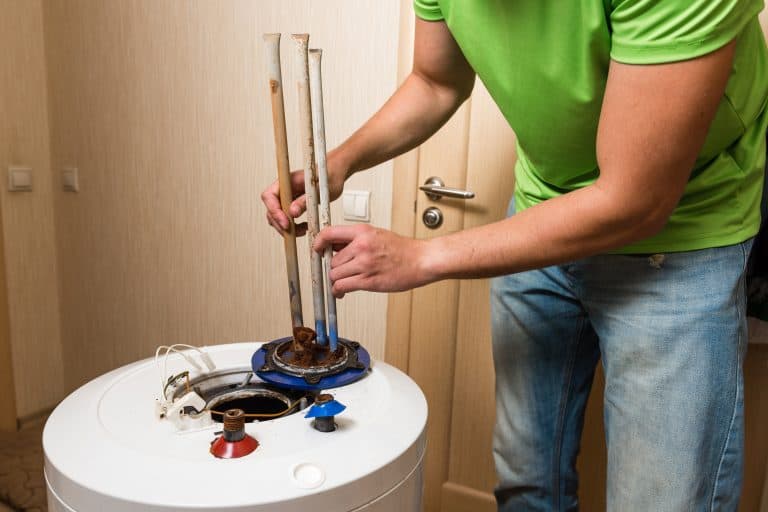Introduction
Imagine turning on your faucet and being greeted by the putrid stench of rotten eggs. It’s a distressing experience that can make you question the safety of your water. You may wonder, “Why does my water smell like rotten eggs?” and “How can I fix it?” This article will delve into the causes of this unpleasant odor and provide comprehensive solutions to restore fresh, odorless water to your home.

Image: sensibledigs.com
Causes of Rotten Egg Smell in Water
The rotten egg smell in water is typically caused by the presence of hydrogen sulfide (H2S) gas. This gas is produced by bacteria that thrive in oxygen-deprived environments, such as water heaters, well water systems, or stagnant pipes. When these bacteria decompose organic matter, they release hydrogen sulfide as a byproduct.
-
Bacteria in Water Heaters:
If your water heater is not properly maintained, bacteria can accumulate in the tank and produce hydrogen sulfide. The ideal temperature range for bacteria growth is between 90°F and 120°F, making water heaters a prime breeding ground. This problem is more common in older water heaters that have not been flushed and cleaned regularly.
-
Well Water Contamination:
Well water can become contaminated with hydrogen sulfide from various sources, including nearby septic tanks, animal waste, or decaying vegetation. When groundwater passes through these contaminated areas, it can pick up hydrogen sulfide and carry it into your home’s water supply.
-

Image: amarcoplumbing.comStagnant Pipes:
Water sitting in unused pipes for extended periods can develop a rotten egg smell due to bacterial growth. This is especially common in vacation homes or infrequently used bathrooms. When water is not flowing through the pipes regularly, bacteria can accumulate and produce hydrogen sulfide.
Consequences of Rotten Egg Smell in Water
While the rotten egg smell in water is unpleasant, it generally poses no immediate health risks. However, prolonged exposure to high levels of hydrogen sulfide can cause irritation of the eyes, nose, and throat. In extreme cases, it can lead to respiratory problems, such as asthma or bronchitis. Additionally, the odor can permeate your home and affect the taste and smell of food and beverages.
Solutions to Fix Rotten Egg Smell in Water
-
Flush and Clean Water Heater:
Regularly flushing and cleaning your water heater is essential to prevent hydrogen sulfide production. Follow the manufacturer’s instructions for flushing and cleaning, which typically involves draining the tank and removing any sediment or debris. Once flushed, refill the tank with fresh water and check if the odor has dissipated.
-
Shock Chlorination:
Shock chlorination involves adding a high dose of chlorine to your water system to kill bacteria and eliminate hydrogen sulfide. This method requires professional expertise, as incorrect chlorine levels can pose health risks. Contact a licensed plumber to perform shock chlorination if the problem persists after flushing and cleaning your water heater.
-
Hydrogen Peroxide Treatment:
Hydrogen peroxide is a natural disinfectant that can neutralize hydrogen sulfide. Add 3% hydrogen peroxide solution to your water heater according to the manufacturer’s instructions. Allow the solution to circulate for several hours, then flush the system with fresh water. This treatment is safe for most water systems, but it’s recommended to test a small area first to ensure it does not damage any plumbing components.
-
Activated Carbon Filter:
Installing an activated carbon filter in your home’s water supply can effectively remove hydrogen sulfide. Activated carbon is a highly porous material that traps and absorbs impurities, including hydrogen sulfide molecules. A whole-house activated carbon filter can treat all the water entering your home, while point-of-use filters can be installed at specific faucets or appliances.
-
Aeration:
Aeration involves introducing oxygen into the water to create an environment less hospitable to bacteria that produce hydrogen sulfide. There are various aeration devices available, such as venturi aerators or air injection systems. These devices add oxygen to the water, which helps inhibit bacterial growth and reduce hydrogen sulfide production.
Water Smells Like Rotten Eggs How To Fix
Conclusion
Encountering a rotten egg smell in your water can be alarming, but it’s usually a sign of a manageable problem. By understanding the causes and implementing the solutions outlined in this article, you can restore fresh, odorless water to your home. Remember to maintain your water heater, address any potential water contamination sources, and consider installing a filtration or aeration system if necessary. By taking these steps, you can ensure a safe and pleasant water experience for your household.